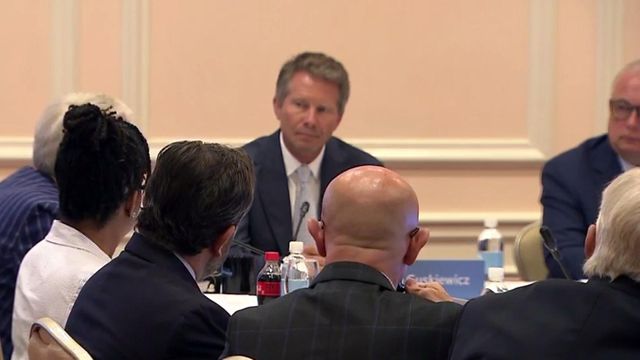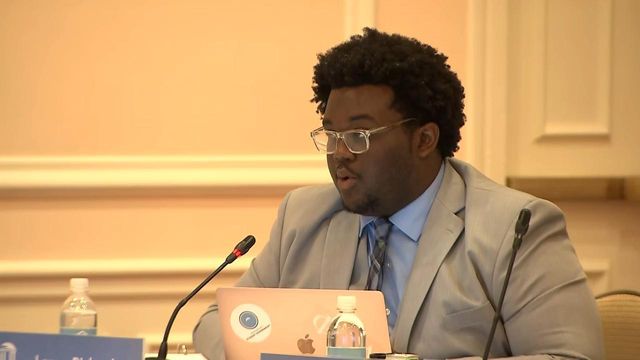Trustees go out of their way to praise embattled UNC-Chapel Hill chancellor
As speculation continues over his future, Chancellor Kevin Guskiewicz and the University of North Carolina at Chapel Hill Board of Trustees met Thursday to discuss th eupcoming academic year, the ongoing pandemic and racial equity.
There was no public discussion among trustees either Wednesday or Thursday about the chancellor's job status, even though rumors have swirled in recent days that he would soon be fired.
Mimi Chapman, chair of the university's Faculty Council, told colleagues Wednesday that she learned over the weekend that "Kevin's performance would be evaluated in the coming days" by trustees and that officials were considering Clayton Somers and John Hood as possible interim chancellor.
Somers is UNC-Chapel Hill's vice chancellor for public affairs and secretary and a former top aide to state House Speaker Tim Moore. Hood is chairman of the John Locke Foundation, a conservative think tank, and president of the nonprofit John William Pope Foundation, both of which were created by Republican donor Art Pope, a member of the UNC Board of Governors.
According to the UNC System's Policy Manual, all chancellors must be reviewed by their boards of trustees in the second spring after their appointment. Guskiewicz took office in 2019, so he would be due for an evaluation.
"It is my strong belief that now is not the time for a leadership change on our campus," Chapman said.
"We cannot and must not accept political partisanship, maneuvering or interference at our home, in our house," Student Body President Lamar Richards, who is a member of the Board of Trustees, said Thursday. "External influence must have no place and no say in our sacred framework of shared governance."
Two board members made it a point to praise Guskiewicz during Thursday's meeting.
Ralph Meekins thanked him for his leadership during the pandemic and the racial justice issues the university has dealt with over the past two years.
"I appreciate all he does for this university, and I just hope that we will all be calm about us, reflect upon what we're doing here at this university [and] celebrate all the wonderful things is now doing," Meekins said.
“We have committed to work together on outstanding issues at the university. We are supportive of the chancellor as we work together to move this university forward," said Dave Boliek, who was elected Wednesday as board chairman.
Boliek sidestepped on Wednesday when WRAL News asked him if he supported Guskiewicz. He also dismissed the speculation over the chancellor's future as mere rumors, noting that the Board of Trustees doesn't have the authority to remove him from office.
David Powers, a member of the UNC System Board of Governors, which does have the power to fire a chancellor, said Thursday that he's unaware of any effort to remove Guskiewicz and that he supports the chancellor.
"To the best of my knowledge, there are no discussions on our board about removal of the chancellor," Powers said. "If you look at the performance metrics of UNC-Chapel Hill, they’ve been doing very well. And I’ve heard no discussion about any removal efforts."
UNC President Peter Hans, who can advocate for a chancellor to be fired, called the speculation over Guskiewicz's future "conspiracy theories."
"The university’s mission is teaching, research and public service, not rumors and politics," Hans said in a statement. "I would encourage everyone to take a deep breath, focus on that mission and not chase conspiracy theories."
Guskiewicz has declined to discuss the rumors.
"I've got a job to do here leading this great university," he said Wednesday. "That's what I've been focused on."
Still, the deans of various UNC-Chapel Hill schools sent letters to the Board of Trustees expressing support for Guskiewicz, Chapman said, and the Faculty Council approved its own resolution affirming their confidence in the chancellor and stating that changing leadership would be "deeply destabilizing" for the entire state, not just the campus.
Guskiewicz did say during Thursday's meeting that he is committed to working with the Black Student Movement, the Carolina Black Caucus and other groups to improve diversity and inclusion on the campus.
"While we are making progress in many areas, there is still much work ahead," Guskiewicz said.
UNC-Chapel Hill has been beset by racial tensions in recent weeks, highlighted by the bitter fight over giving a tenured faculty position at the Hussman School of Journalism and Media to Pulitzer Prize-winning journalist Nikole Hannah-Jones.
A UNC-Chapel Hill alumna and reporter for The New York Times, Hannah-Jones is most known for her work on the 1619 Project, which looks at American history through the lens of slavery and its lasting impact on the country. She eventually took a tenured position at Howard University, a historically Black school in Washington, D.C.
"I often think about the fact that this institution, our institution of the University of North Carolina at Chapel Hill, was not built for people who look like me. Rather, it was built by people who look like me," Richards, the student body president, who is Black, told fellow members of the Board of Trustees.
Regarding changes to coronavirus restrictions, Guskiewicz expressed his excitement to welcome students back next month, calling it the largest incoming class ever.
Amy Johnson, vice chancellor for student affairs, said the university anticipates being at about 95 percent occupancy for main campus in the fall, although two dorms will continue to be set aside for students in quarantine or isolation. Students who are vaccinated and asymptomatic but are close contacts to people with COVID-19 will not be required quarantine, Johnson said, saying that's yet another incentive to get vaccinated.
Masks will still be required in most public indoor spaces, leaders said, even if students and staff are vaccinated. Masks will not be required outdoors regardless of vaccination status.












